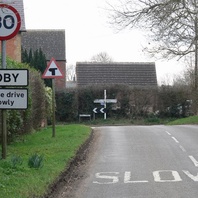
Viking Names
Hoby
Hoby, in the East Goscote Hundred of Leicestershire, is an Anglo-Scandinavian hybrid name from Old English hoh ‘a heel; a sharply projecting piece of ground’ and Old Norse by ‘A farmstead, a village’. The name is topographically appropriate because the present village sits at the foot of a great spur of land which abuts the River Wreake. Hoby is now a joint parish with Rotherby.
Read More

Viking Names
Snibston
Snibston, in the West Goscote Hundred of Leicestershire, is a hybrid place-name formed from the Old Norse male personal name Snípr, a byname related to Norwegian snipa ‘a miser, an unsociable person’ and Old English tun ‘farm, settlement’. Snibston became a joint parish with Ravenstone in 1884 when Ravenstone moved from Derbyshire to Leicestershire.
Read More
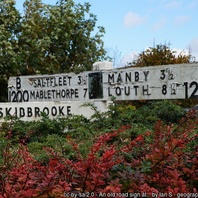
Viking Names
Saltfleetby
Saltfleetby, in the Louth Eske Wapentake of Lincolnshire, comes from the stream-name Saltfleet (Old English salt and flēot) and the Old Norse element by ‘farm, settlement’, referring to the latter’s location. There are actually three Saltfleetbys, now identified by the dedications of their parish churches, Saltfleetby All Saints, Saltfleetby St Clement, and Saltfleetby St Peter.
Read More

Viking Names
Roston
Roston, in the Appletree Hundred of Derbyshire, comes from the Old Norse male personal name Hrosskell and the Old English element tun ‘farm, settlement’. It is thus a hybrid name. Roston is a joint parish with Norbury.
Read More
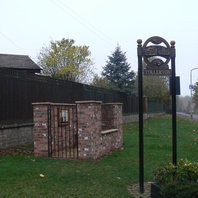
Viking Names
Tollerton
The place-name of Tollerton, in the Bingham Wapentake of Nottinghamshire, has suffered a good deal of corruption. Twelfth-century spellings of the name point to the Old Norse male personal name Þórleifr as the first element. Later there seems to have been confusion with another Old Norse male personal name, Þórleikr. The second element is Old English tun ‘an enclosure; a farmstead; a village; an estate’, making it a hybrid name.
Read More
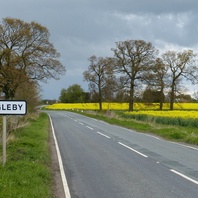
Viking Names
Ingleby
Ingleby, historically in the West Riding of Yorkshire, takes its name from the Old English ethnonym Engle ‘the Angles, later the English’ and Old Norse by ‘a farmstead, a village’. There is also an Ingleby in Derbyshire, close to the Viking winter camp at Repton, and the site of a unique Viking Age cremation cemetery. The exact implications of such a name are not yet fully understood and are the subject of ongoing work by Dr Jayne Carroll of the Institute for Name-Studies, University of Nottingham. Ingleby in Lincolnshire is now a joint parish with Saxilby.
Read More
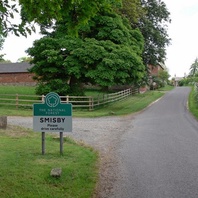
Viking Names
Smisby
The first element of Smisby, in the Repton and Gresley Hundred of Derbyshire, is either Old Norse smiðr ‘smith’ or it Old English cognate smið, the second element of the place-name is Old Norse by ‘a farmstead, a village’.
Read More
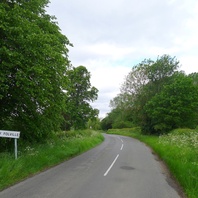
Viking Names
Ashby Folville
Ashby Folville, in the East Goscote Hundred of Leicestershire, is likely an Anglo-Scandinavian name coming from Old English æsc ‘ash-tree’ and Old Norse by ‘a farmstead, a village’. Some spellings may show influence of Old Norse eski ‘a place growing with ash-trees’ or even Old English esce ‘a stand of ash-trees’ on the first element. The suffix Folville comes from the de Folevill family who held the manor from the mid twelfth century until at least 1368.
Read More
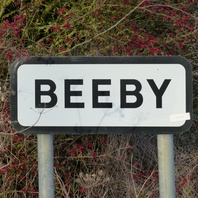
Viking Names
Beeby
Beeby, in the East Goscote Hundred of Leicestershire, is an Anglo-Scandinavian hybrid from Old English beo ‘a bee’ and Old Norse by ‘a farmstead, a village’. The high valuation of Beeby in the Domesday Book has led scholars to believe that it was originally an Anglian settlement taken over and renamed by Scandinavians.
Read More

Item
Croxall
Croxall, historically in the Repton and Gresley Hundred of Derbyshire, probably comes from the Old English male personal name Croc derived from the Old Norse personal name Krókr and the Old English halh ‘nook, corner of land’. However, it is also possible that the first element is from the Old English topographical element croc ‘crook’, perhaps ‘nook’. The parish was transferred to Staffordshire in 1894.
Read More

Viking Names
Ravensdale Park
Ravensdale Park, in the Appletree Hundred of Derbyshire, clearly derives its name from either the bird or a person with a name that corresponds to that of the bird, but its linguistic origin is difficult to pin down because of the similarities between Old Norse and Old English. The first element could be Old Norse hrafn ‘raven’, or the Old Norse male personal name Hrafn, or Old English hræfn ‘raven’, or the Old English male personal name Hræfn. The second element is either Old Norse dalr ‘valley’ or Old English dæl ‘a pit, a hollow; later a valley’. It was one of the parks of Duffield Frith hence the later affix ‘park’. In the Nottinghamshire place-name Ranskill, the first element is more likely to be Old Norse as the second element is also in that language, but the difficulty of deciding between the bird and the personal name Hrafn is the same.
